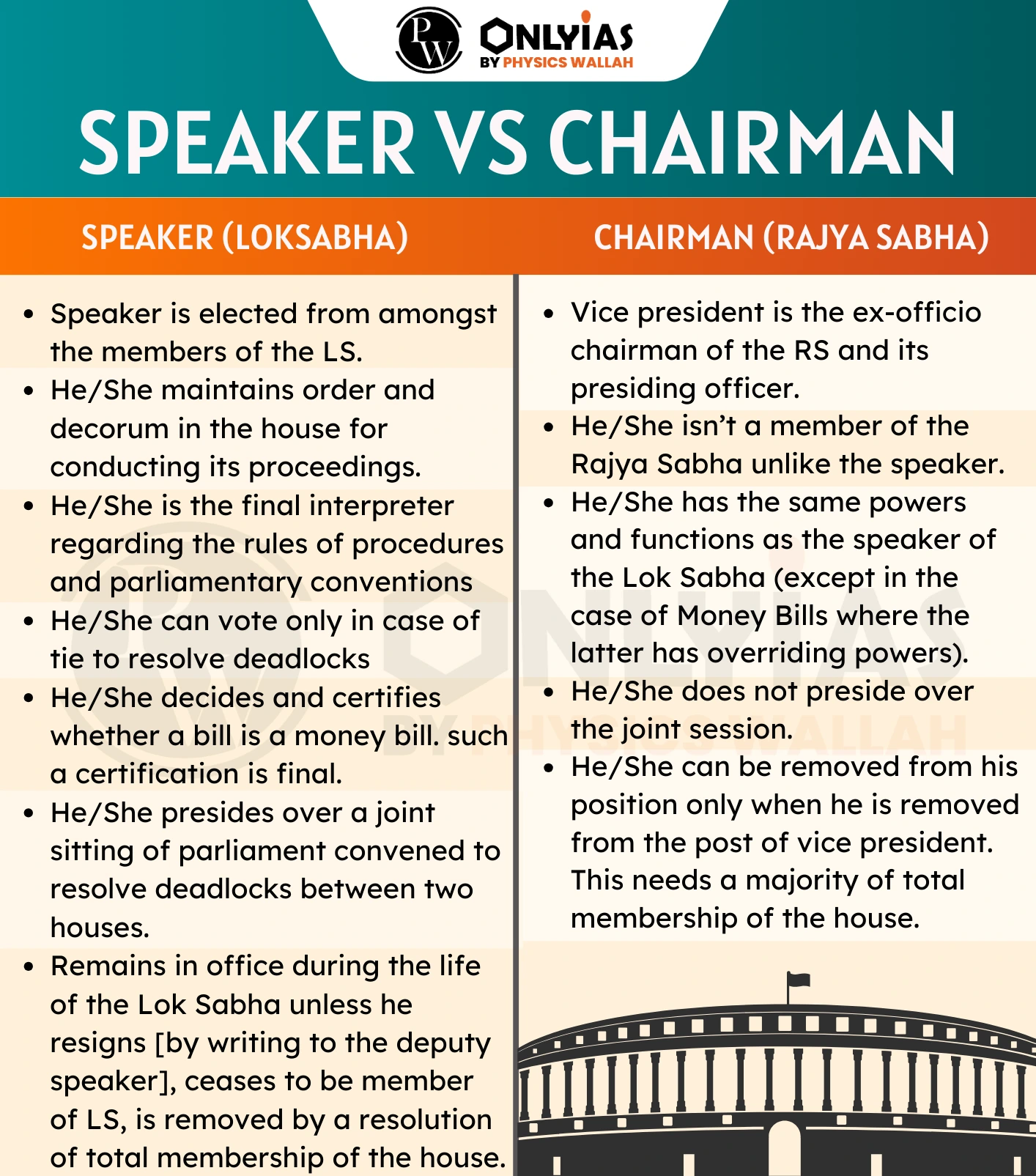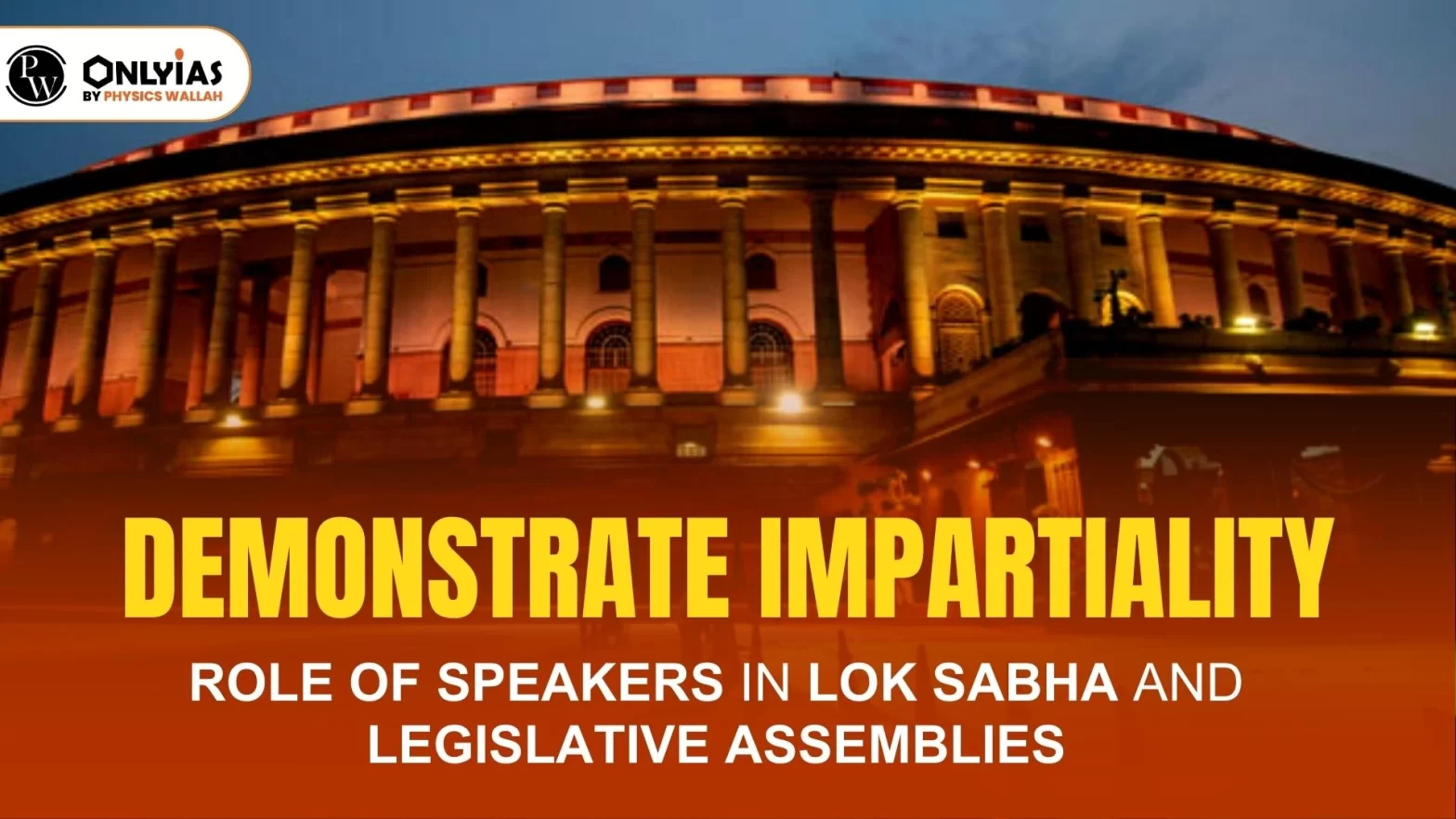Context:
| Relevancy for Prelims: Presiding Officers of Lok Sabha and Legislative Assemblies, Indian Parliament, Money Bill, Supreme Court, Parliamentary Committee and Tenth Schedule – Anti Defection Law.
Relevancy for Mains: Speakers of the Lok Sabha and Legislative Assemblies, Their roles, functions and concerns and the measures need to be taken. |
Office of the Speaker and Chairman – Evolution
- Emergence: It emerged in medieval Britain, as a spokesman of the House of Commons in dealings with the King.
- Historical Roles: Until the 17th century, the Speaker was often seen as an agent of the Crown.
- Since the middle of the 19th century, the Speaker has been considered to be an impartial Chairman of the House of Commons.
- They are the custodians of the rights and privileges of the House, its committees and its members.
Speaker’s Role and Challenges in India
- Constitutional Provisions: Under the Indian Constitution, the Lok Sabha and Legislative Assemblies elect two of its members to be the Speaker and Deputy Speaker, respectively.
- Functions Performed
- Traditional roles with respect to the conduct of business
- Certifying a Bill to be a Money Bill (over which the Rajya Sabha/Legislative Council have a limited role)
- Deciding on disqualification of members of the House under the Tenth Schedule for defection
- Concerns
- Misuse of Provisions: Rules for suspending members have been misused often against the opposition.
- For example: Recently, the leader of the Congress party in the Lok Sabha, Adhir Ranjan Chowdhury, was suspended for his remarks against the Prime Minister (which was later revoked), but no such action has been taken against the Bharatiya Janata Party (BJP) member, Ramesh Bidhuri, for passing communal allegations against the Bahujan Samaj Party Member of Parliament, Danish Ali.
- On non-referring of bills to Standing Committees: The Speaker is the authority to refer Bills introduced to the Parliamentary Standing Committees. However, even significant Bills that require detailed scrutiny are not referred to such committees.
- For example: As against more than 60% of Bills referred to committees in the Lok Sabha during 2004-14, less than 25% have been referred during 2014-2023.
- Circumvent on the Anti-Defection law: The Speaker of the House is expected to perform this constitutional role in a neutral manner, however, by observing many past instances, it has been inferred that the Speakers favor the ruling regime.
- Associated Cases
- Kihoto Hollohan vs Zachillhu Case (1992): The minority judges in this case were of the view that vesting the power to decide on defections with the Speaker violates the basic democratic principles.
- Keisham Meghachandra Singh vs The Hon’ble Speaker Manipur (2020): The Supreme Court in this case recommended that Parliament amend the Constitution to vest these powers in an independent tribunal to be headed by judges.

Also read: Restoring Order: Reforming Indian Parliamentary Conduct
The Path Ahead
- Follow British Practice: Need to adopt the practices as in Britain to instill confidence in the office of the Speaker, who resigns from the associated political party to reflect his/her impartiality.
- Constitutional and Moral Practice: As the Presiding Officer of the Lok Sabha at the Centre and the Legislative Assembly in the States, the Speaker is required to act in an impartial manner.
- An Independent Tribunal: Need for an independent tribunal for resolving questions on disqualification of members on the basis of defection.
Conclusion:
Ensuring impartiality in the role of Speakers for Lok Sabha and Legislative Assemblies is imperative, necessitating adherence to constitutional principles, adoption of unbiased practices, and consideration of an independent tribunal for addressing concerns related to defection.
| Prelims Question (2022)
With reference to anti-defection law in India, consider the following statements:
1. The law specifies that a nominated legislator cannot join any political party within six months of being appointed to the House.
2. The law does not provide any time-frame within which the presiding officer has to decide a defection case.
Which of the statements given above is/are correct ?
(a) 1 only
(b) 2 only
(c) Both 1 and 2
(d) Neither 1 nor 2
Ans: (b) |
![]() 30 Oct 2023
30 Oct 2023

